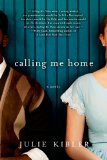Summary | Excerpt | Reading Guide | Reviews | Beyond the Book | Read-Alikes | Genres & Themes | Author Bio

This article relates to Calling Me Home
Don't let the sun set on YOU.
 This is typical wording on a sign at the edge of what was called a "sundown town", which gained its name because these towns required people of color to leave their perimeters – not surprisingly – by sundown. These towns, found throughout the USA not just in the South, were explicitly all-white towns. Sometimes the segregation was created by actual town policy, sometimes through restrictive covenants created and maintained by real estate brokers, and sometimes by sheer intimidation from local town employees like police officers and even regular citizens. It is not clear how many of these towns existed but an estimate cites that at one point there were several thousand across the United States, and the state of Illinois had the most within its borders.
This is typical wording on a sign at the edge of what was called a "sundown town", which gained its name because these towns required people of color to leave their perimeters – not surprisingly – by sundown. These towns, found throughout the USA not just in the South, were explicitly all-white towns. Sometimes the segregation was created by actual town policy, sometimes through restrictive covenants created and maintained by real estate brokers, and sometimes by sheer intimidation from local town employees like police officers and even regular citizens. It is not clear how many of these towns existed but an estimate cites that at one point there were several thousand across the United States, and the state of Illinois had the most within its borders.
Since the Civil Rights Act of 1968, sundown towns cannot officially exist. However, while the edge of town signs are no longer posted, it's difficult to know what sort of discrimination might be practised under the radar in some small towns.
 Although these towns affected African Americans the most, other ethnic groups were sometimes targeted. Chinese Americans, for example, were targeted in Idaho in the late 19th century, and according to sociologist James Loewen, who wrote the book Sundown Towns: A Hidden Dimension of American Racism, after an 1886 anti-Chinese convention in Boise, there were virtually no Chinese Americans living in Idaho. Loewen's book also describes a town in Nevada that would blow a whistle at 6 p.m, which meant that the Native Americans had to leave its perimeters, and there was a town in Connecticut that shut its doors to Jews at sundown.
Although these towns affected African Americans the most, other ethnic groups were sometimes targeted. Chinese Americans, for example, were targeted in Idaho in the late 19th century, and according to sociologist James Loewen, who wrote the book Sundown Towns: A Hidden Dimension of American Racism, after an 1886 anti-Chinese convention in Boise, there were virtually no Chinese Americans living in Idaho. Loewen's book also describes a town in Nevada that would blow a whistle at 6 p.m, which meant that the Native Americans had to leave its perimeters, and there was a town in Connecticut that shut its doors to Jews at sundown.
Loewen is a sociologist who is passionate about his subject, so much so that his reliability is, perhaps, questionable. As a Washington Post review of his book observes, "…Loewen's almost evangelical passion for his material, raises questions of credibility – or at least of potential overstatement. But Loewen expertly dodges those accusations. He devotes almost an entire chapter to explaining his research – detailing his rationale for defining sundown towns, laying out his statistical methods and revealing how he triangulated oral history, written sources and census data to arrive at a 'confirmation.'" But as the review also states, Loewen's case is tough to repudiate: "…When he reports that he's personally verified the existence of roughly 1,000 sundown towns between 1890 and 1930, you believe him. And because he pairs that finding with an analysis of the history, causes and patterns of sundown towns that shows that they were, in many ways, as logical – and often as violent – an outgrowth of American racism as lynching, he ultimately makes a strong case that sundown towns were a significant feature of the American landscape. As is often the case when the subject is race, the relative lack of hard evidence ultimately becomes part of the story, rather than a hindrance to it."
There has been very little time and research devoted to sundown towns, other than what Loewen has offered. He is, without a doubt, the voice of the cause. And he feels that more investigation is necessary. What made one town become a sundown town, for example, and not another town just down the road? Answers to questions like that one could shed light on mob mentality and offer a new perspective on race relations as well.
More people investigating and more voices offering views on this piece of history would be welcome.
James Loewen wrote an interesting article titled Was Your Town a Sundown Town?
Glasses illustration by Jim Neubecker
Filed under People, Eras & Events
![]() This "beyond the book article" relates to Calling Me Home. It originally ran in February 2013 and has been updated for the
January 2014 paperback edition.
Go to magazine.
This "beyond the book article" relates to Calling Me Home. It originally ran in February 2013 and has been updated for the
January 2014 paperback edition.
Go to magazine.
They say that in the end truth will triumph, but it's a lie.
Click Here to find out who said this, as well as discovering other famous literary quotes!
Your guide toexceptional books
BookBrowse seeks out and recommends the best in contemporary fiction and nonfiction—books that not only engage and entertain but also deepen our understanding of ourselves and the world around us.